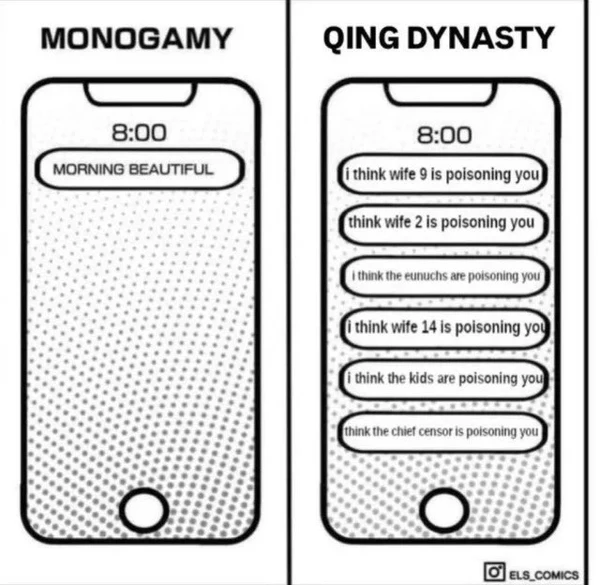I would like to believe that if you bothered to read all this you've learned something that you can apply to the rest of the world. Because the whole world is fricked up in the same ways that Lebanon is. It's just way worse there. A few things I've learned in my time researching the subject:
One of the first things you'll hear in any mayo midwit's account of what's going on in the Middle East is that all the conflicts are due to "ancient hatreds". Everything would be solved if these barbarian savages would just give up their grudges they've been holding on to since medieval times. That would be a very convenient way to explain everything and make us feel good about ourselves because we're too civilized to have ancient hatreds. The problem is, it doesn't hold up to the slightest bit of scrutiny. How was every faction allied with practically every other faction at some point in those 15 years if they can't let go of their hatred? By the end, even the Lebanese Forces and Palestinians who had started the war in the first place were allies. Walid Joumblatt worked for the guy who killed his father for decades. If anything, the Lebanese are notable for how forgiving they are. When they fight each other it's because that makes sense to them in the immediate situation. People in Lebanon have always had many good reasons in the present to fight each other without needing any ancient hatreds.
Kamal Joumblatt with his sister, Linda al-Atrash. Bashir Gemayel found out which Christian thugs killed her and offered him their names. He was like "nah, forget about it ".
Unfortunately, while most people feel compelled to participate in violence by the situation they're stuck in, some just like the violence. No matter how perfect your society is, you're going to have a certain number of sociopaths who just have no interest in the good of the community. They'll do anything they can to get ahead. That's why it's important for society to figure out how to control them. We have to make sure that killing and stealing isn't worth it. In Lebanon, the government institutions that normally keep evil people in line fell apart. When society is broken up into a bunch of little 500-man militias, it's extremely difficult to hold criminals accountable. There were dozens of cease-fires in the Lebanese Civil War and all but the last one broke down. Usually it was because some low-ranking guy wanted the war to continue so he started shooting.
When you don't keep your people under control, this is what happens.
The breakdown of public order is most obvious in kidnappings and assassinations, the two things Lebanon was most famous for. It began at the start of the war when checkpoints were set up and people were caught on the wrong side of the lines from home. Why not shake them down a little? But without law enforcement it quickly became obvious that you just grab someone and demand a ransom. If they kidnapped one of your people, often the best solution was to kidnap one of theirs to swap. It spirals out of control very fast. Likewise, it didn't take long for the militias to realize that during the many cease-fires that made up most of the 15 years, you could just drive into your enemy's neighborhood and shoot him at his front door. As security got better you needed to [put a bomb on his car](https://, and when they kept all their cars in garages you had to put a huge bomb in the trunk of another car and detonate it as he drove by. Investigating these bombings during a civil war was impossible (and isn't much easier in our time so the only way to respond was to guess which militia was responsible and bomb them. We'll never know how many times a third party assassinated someone to push two rival groups into war.
TWA Flight 847, June 1985. Eventually simple kidnapping isn't enough. If you've got dozens of prisoners held by your enemies, hijack an airplane and grab dozens of hostages to trade for them.
My main conclusion is that nobody has fixed Lebanon yet because it's really really hard to. If there was an easy solution someone would have figured it out by now. Everyone knows that to make any fundamental change the system that pits the sects against each other must be broken. Many people with good intentions have tried. All of them failed. Most of them were killed. We can't expect to see anyone succeed in our generation. But maybe the Lebanese of today can go part of the way, rooting out corruption and building ties across sectarian lines. Their children could be the ones who finally break out of the cycle.
Sep 9, 1982. The US Marines' mission had been a complete success, escorting the Palestinian troops to their evacuation ships. The 15 day assignment had been carried out without bloodshed. They would be back 20 days later on an open-ended mission that was not accomplished.
So what can we do from the outside to help? The Americans came with good intentions but that wasn't enough. The Israelis came with overwhelming force and that wasn't enough. In the end it was the Syrians who finally imposed their ending on the civil war. They had what the other powers lacked: the willingness to get their hands dirty. I don't just mean violence (although that is one part of it), I mean being willing to spend money and energy, to kill whoever is in the way, to send your own people to their deaths. And you have to be willing to do that year after year, however long it takes. The Syrians had that because Lebanon had to function in order for Syria to function. Despite being a small, poor, backward country, Syria managed to outlast all its rivals because Lebanon was that important to them.
Syrian troops enter Beirut, November 1976. They came to help at first. By the end of the war they had fought the Palestinians, Christians, Israelis, and occasionally their supposed allies.
So to answer the question, the first thing we need to do before we try to help is to ask ourselves what kind of commitment we're willing to make. For almost all of us, Lebanon is just a little country far away that doesn't have the slightest impact on our lives. We're just not going to sacrifice as much to impose our will there as Syria or Israel or the main regional powers. We've got to be realistic and only get involved if we've got the patience to keep up that level of involvement for years. Sending in the Marines now might solve a short-term crisis, but it's not going to get to the root of Lebanon's problems because they can't stay there long enough.
The ruins of the US Marine barracks, Oct 23, 1983. An expertly-driven suicide truck bomb leveled the building, kill 241 men. The same day a similar attack against the French killed 58.
At this point, we can probably do the most good by going after money laundering. The corrupt elite have drained enormous amounts of money from Lebanon and stashed it in Europe. If we cut that flow they won't keep getting richer and more powerful. If we find the money they've already laundered and seize it, we cut their balls off and get the cash to fund reconstruction at the same time. When corruption isn't so obscene we can make cautious investments in rebuilding infrastructure, especially targeting projects that force the different sects to cooperate to benefit from it. We can train and equip a Lebanese Army capable of maintaining order and also deterring the aggression of Syria and Israel. Whatever we do, we need to know what our limit is and not get sucked into trying to do more. Maybe with that help, the Lebanese can save themselves.

















Jump in the discussion.
No email address required.
Thank you, OP, I much enjoyed this series of posts.
Jump in the discussion.
No email address required.
Jump in the discussion.
No email address required.
More options
Context
More options
Context